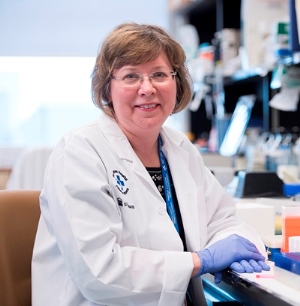Estrogen and ovarian cancer: study provides first molecular link
 Estrogen therapy can relieve symptoms of menopause in some women, but it also slightly increases the risk of ovarian cancer. New research from Dr. Barbara Vanderhyden's team provides the first possible molecular explanation for this link.
Estrogen therapy can relieve symptoms of menopause in some women, but it also slightly increases the risk of ovarian cancer. New research from Dr. Barbara Vanderhyden's team provides the first possible molecular explanation for this link.
Using cells derived from the surface of the ovary, they found that prolonged estrogen treatment increases the level of a molecule called microRNA-378. This molecule releases the "brakes" that normally control cell growth by changing the expression of a gene called Dab2. The end result is an increased risk of ovarian cancer.
This research also suggests a mechanism by which natural estrogen changes during ovulation could play a role in the start of ovarian cancer. Future research could lead to new approaches for prevention and treatment.
Authors: Nhung H. Vuong, Omar Salah Salah, Barbara C. Vanderhyden
Funding: This research was possible because of generous donations to The Ottawa Hospital for Cancer Research. This study was also supported by the Canadian Institutes of Health Research and the Government of Ontario (Ontario Graduate Scholarship and Queen Elizabeth II Graduate Scholarships in Science and Technology).
Core resources: StemCore
The Ottawa Hospital: Inspired by research. Driven by compassion
The Ottawa Hospital is one of Canada's largest learning and research hospitals with over 1,100 beds, approximately 12,000 staff and an annual budget of over $1.2 billion. Our focus on research and learning helps us develop new and innovative ways to treat patients and improve care. As a multi-campus hospital, affiliated with the University of Ottawa, we deliver specialized care to the Eastern Ontario region, but our techniques and research discoveries are adopted around the world. We engage the community at all levels to support our vision for better patient care. See www.ohri.ca for more information about research at The Ottawa Hospital.
University of Ottawa: --A crossroads of cultures and ideas
The University of Ottawa is home to over 50,000 students, faculty and staff, who live, work and study in both French and English. Our campus is a crossroads of cultures and ideas, where bold minds come together to inspire game-changing ideas. We are one of Canada's top 10 research universities--our professors and researchers explore new approaches to today's challenges. One of a handful of Canadian universities ranked among the top 200 in the world, we attract exceptional thinkers and welcome diverse perspectives from across the globe. www.uottawa.ca
Media Contact
Jennifer Ganton
Director, Communications and Public Relations
Ottawa Hospital Research Institute
Office: 613-798-5555 x 73325
Cell: 613-614-5253
jganton@ohri.ca
Learn more about:
The Ottawa Hospital is a leading academic health, research and learning hospital proudly affiliated with the University of Ottawa and supported by The Ottawa Hospital Foundation.


